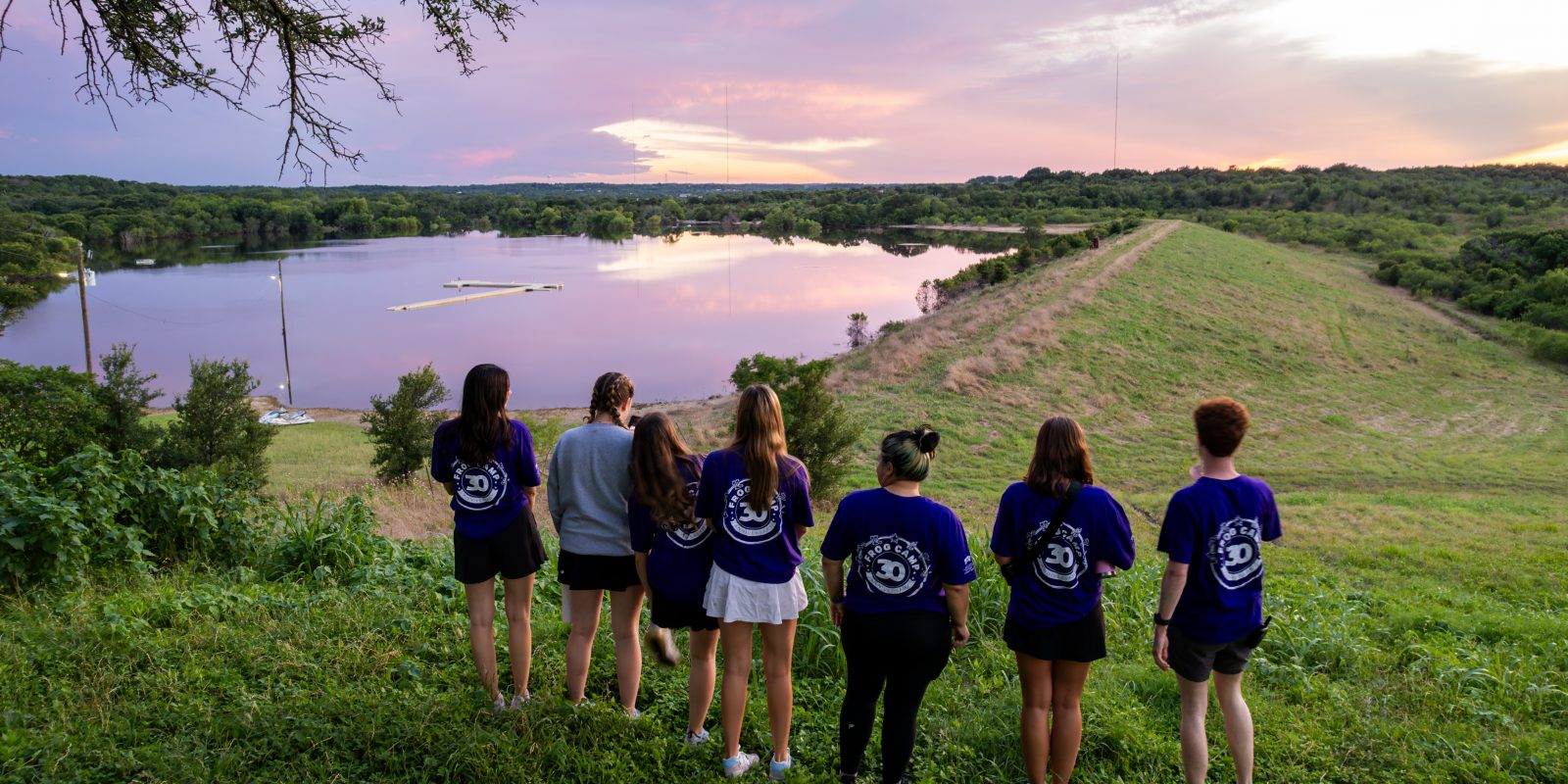
Facilitators take in the view of the reservoir near Greene Family Camp, which hosted Camp Challenge. Photo by James Anger
Building Community
Thirty years after its inception, Frog Camp has helped create a campus steeped in TCU traditions — and at least one marriage.
In August 1995, Fara Brown-Owen ’99 stepped off the bus to Frog Camp. The campsite in Bruceville, Texas, was wooded and secluded, with concrete cabins, a cafeteria and wide-open spaces for sports and obstacle courses. The sun beat down on the campers, but despite the sweltering summer heat, she said, the cheerful energy of the camp leaders — upper-level students, faculty and staff — greeting the incoming first-year students was infectious. Among the many faces of her welcoming party, she spotted a student facilitator with black hair and a wide, boyish smile.
His name was Chris Poland ’98, and he captured her attention in a heartbeat. His natural charisma drew people to him. “He was so enthusiastic and so personable … so kind,” she said. “It was instant connection for me.”
That week at Frog Camp changed her life. Through all the team-building exercises and dance parties, she fell for both TCU and Chris. After camp, she called her mother and told her, “I just met the man that I want to marry.”
They wed five years later, and some of their fellow Frog Camp friends attended the wedding.
This year marks Frog Camp’s 30th anniversary, something Fara Poland said she can’t believe. She and Chris have two children — their daughter, Emma, is a biology major at TCU, and their son, Dailey, just started touring colleges.
“Everybody who asks me about TCU,” Chris Poland said, “one of the first things I tell them about is Frog Camp and our experience.”
The Camper’s Spirit
Frog Camp is a multiday sleepaway orientation program in which incoming students learn about TCU culture through exercises such as trust falls, skits and field trips. The camp is where many students learn campus traditions and the Riff Ram chant.
TCU offers multiple camps each year. The Fort Worth-based camps allow students to visit historical and cultural sites, including the Stockyards and Sundance Square. Another introduces transfer students to all things Horned Frog. Out-of-state and abroad camps offer incoming students a taste of adventure before college life commences. In the daring mystery camp, participants don’t know their destination until arriving at the airport.
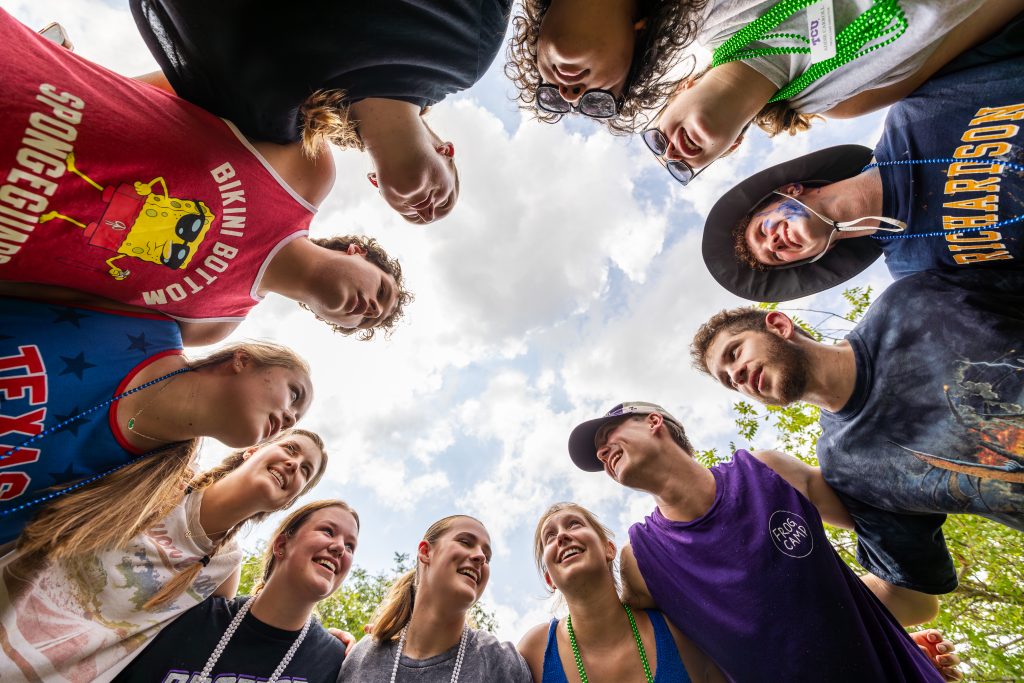
First-year students bond during Frog Camp Challenge in early June. Campers stretch their abilities as they compete on a challenge course and in the Grimy Games. Photo by James Anger
Kathy Cavins-Tull, vice chancellor for student affairs, said about three-quarters of incoming students attend Frog Camp. “It is part of our culture,” she said. “Students regularly associate their camp as part of their first-year identity.”
The adventures started brewing in February 1994, when Barbara Herman ’91 PhD, then interim dean of students, proposed the idea of offering incoming students an extended orientation and camping experience.
Don Mills ’72 MDiv, the longtime vice chancellor for student affairs, gathered a think tank to bring Herman’s idea to life. Over the next six months, the team determined which university traditions to explore with participants, established the camp model and named the program. They chose a challenge course and team-building model. The first Frog Camp was held later that year at the Greene Family Camp in Bruceville, near Waco, Texas.
The program started in summer 1994 with 111 students at one campsite. In 2024, students could choose among 13 camps, and more than 1,500 students opted for the experience.
Chris Poland attended that first Frog Camp in August 1994. He said camp activities were designed to encourage students to bond while learning about TCU culture. Beyond the rope courses and dance parties, he said the most meaningful exercise was when campers gathered and talked about life. “People would open up, and it would become this really good therapeutic experience.”
He became a camp facilitator — a current student who guides groups of about a dozen through the camp — the following year and then a two-year camp director.
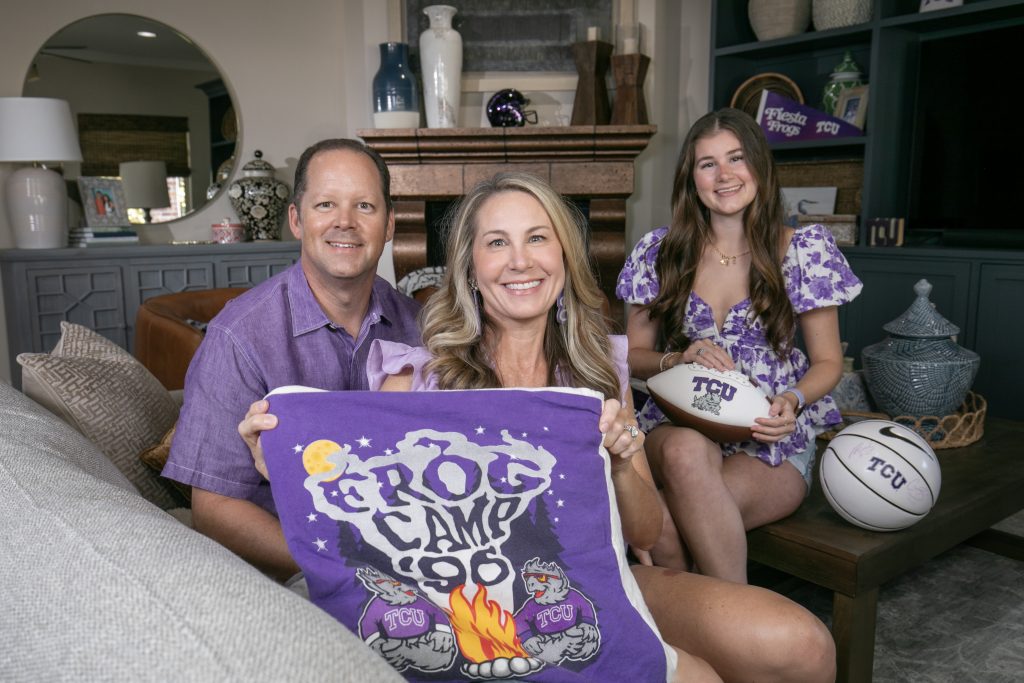
Frog Camp is a Poland family tradition. Chris attended the camp in 1994; when he returned as a facilitator, he met Fara. Their daughter, Emma, attended in 2021. Photo by Rodger Mallison
Fara Poland said her first taste of Frog Camp encouraged connections with students, faculty and staff, some of whom became her mentors. She enjoyed camp so much that she, like Chris, became a facilitator.
“For me to become someone who could also be the peer mentor, that could be the connection that somebody else needed when they were a newbie on campus, that was important to me,” she said.
A Love Story
After meeting at Frog Camp, Fara and Chris Poland would see each other around campus. He was a biochemistry major and she a Spanish major on a pre-dental career track, so often their classes were in the same building. They became fast friends, bonding over a love of the Dave Matthews Band and the Cranberries. Fara said they became each other’s support system. “I leaned on him a lot for scholastic support because he was a year older, and he was a really, really good mentor.”
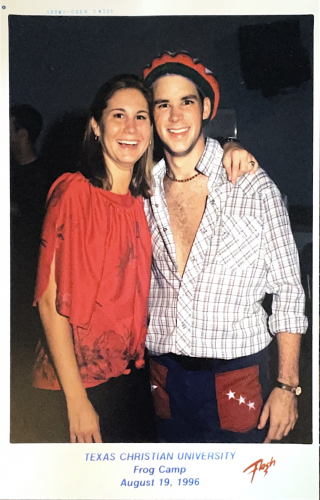
Fara Brown-Owen and Chris Poland
became friends following Frog Camp in 1995. They celebrated their 24th anniversary earlier this year. Courtesy of the Poland family
Their friendship often circled back to that shared bonding experience at Frog Camp.
Chris Poland proposed an idea for a camp where students could give back to the community. He discussed the idea with Herman and Jay Young, then director of TCU’s leadership program. They loved the idea, he said.
From 1997 through the mid-2000s, TCU offered quest camps, Fort Worth-based camps through which students volunteered with Habitat for Humanity, eldercare facilities, schools, churches and local nonprofits.
Fara Poland said she was impressed by the campers volunteering at the Habitat for Humanity site.
“It was hard work, and it was hot,” she said, “but to see young adults supporting each other and feeling inspired to give back and to put their mark on their community in a constructive way … it was incredible.”
In late 1997, Chris Poland said, he felt like he was having a crisis because college was concluding. He thought about his ideal future and then worked up the courage to ask Fara out. This spring marked their 24th wedding anniversary.
Emma Poland said her parents’ story highlights what makes Frog Camp meaningful — the relationships new students create. “It’s really inspiring,” she said. “I think it really exemplifies or personifies what Frog Camp can bring you.”
Frog Camp DNA
Emma Poland said she didn’t feel pressured to pick TCU, despite her parents being alumni. Her parents wear TCU-related clothes and accessories, from purple T-shirts to branded shorts and hats. Many of the clothes in her mother’s closet are purple, white or black. “Our house is decked out,” Emma said. “My dad’s office desk has all the little horned frogs you can collect.”
Once she decided TCU was the right choice, her parents asked when she’d be going to Frog Camp. She said she was excited to go, to learn about the school and meet fellow Frogs.
She chose a Fort Worth-based camp in 2021, where she learned to line dance at Billy Bob’s Texas, explored downtown and fed the giraffes at the Fort Worth Zoo. Like her parents, she chose to become a Frog Camp facilitator.
Most days on campus, she sees and greets people she met at camp. “I think that’s the coolest part. … You meet so many unique, different people,” she said. “Usually I get a good hug or a good wave.”
One of her favorite memories is working the Alpine camp in Colorado in 2023, where campers went hiking, zip lining and whitewater rafting on the Gunnison River. Reflecting on the trip with other facilitators, she thought about how her father had loved his time at Alpine and how meaningful the experience was for her as well. She said the realization moved her so much, she choked up and struggled to speak.
“I don’t think any of [the facilitators] could understand me because I was just so emotional,” she said. “It was such a big part of my dad’s life, and then, now, I got to experience it separately.” In sharing her parents’ story, Emma Poland made a powerful observation: She exists because of Frog Camp.
“My parents always say that we have a double strand of Frog Camp DNA, and purple and white DNA, too,” she said. “It runs in our blood.”


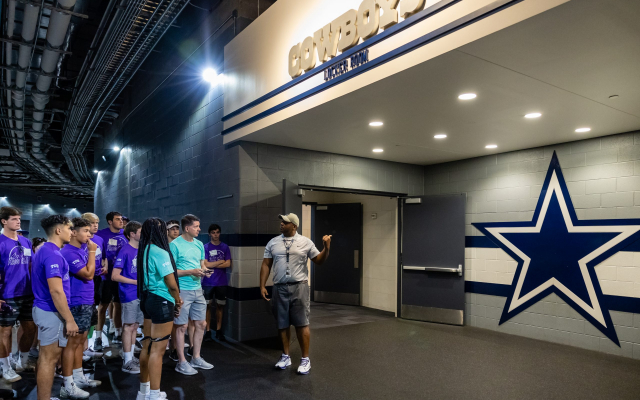
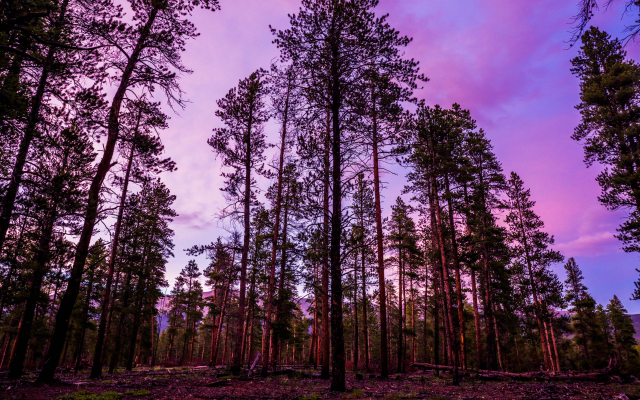
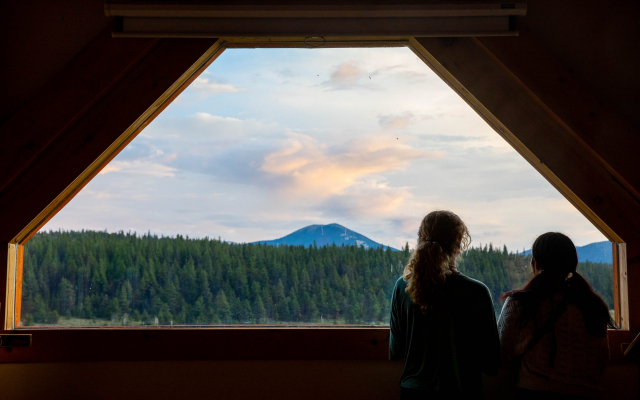
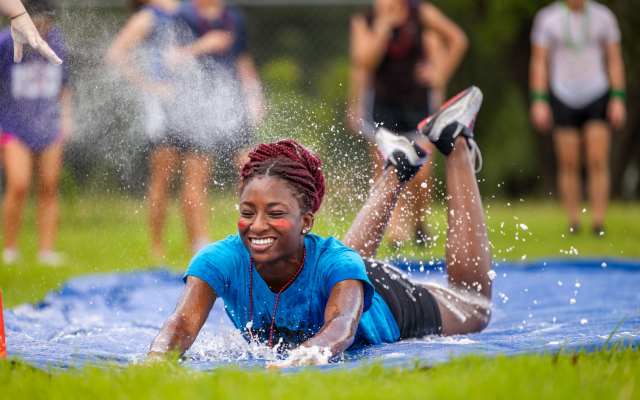

Your comments are welcome
Comments
Related reading:
Features
Passing on the Outside
Race car driver Maddie Aust is a humble trailblazer.
Mem’ries Sweet
FrogHouse Raised Walls and Leaders
A Habitat for Humanity project changed everyone who touched it.
Mem’ries Sweet
It’s a boy. It’s a dog. It’s SuperFrog!
Over the course of a century, the TCU mascot has varied in design and species.